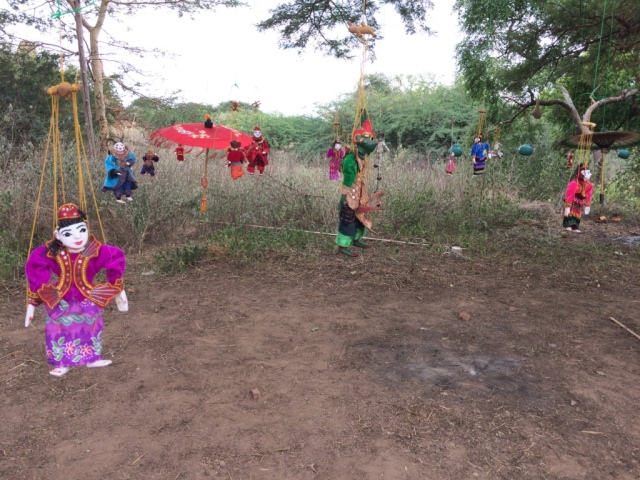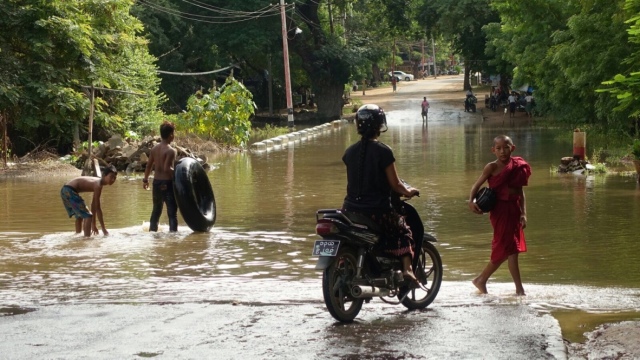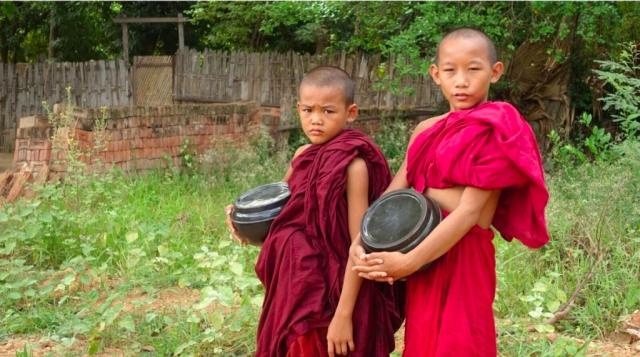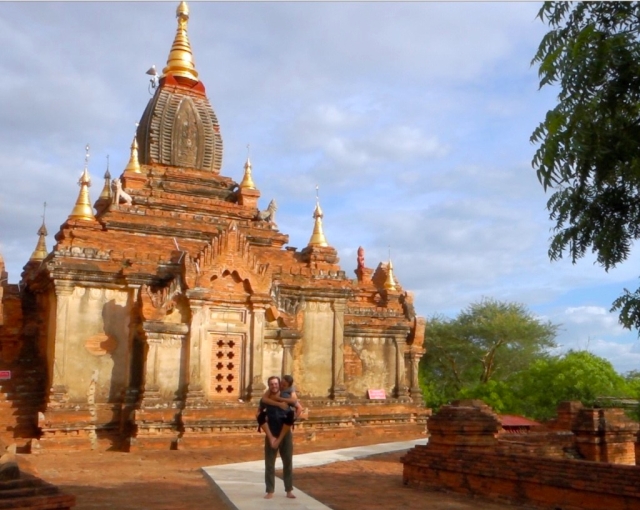Lizard chirps and bird songs woke me up before the sun. We packed our backpacks last night, so we just had to brush our teeth and eat breakfast before catching the bus back to Mandalay for our flight back to Thailand.
On the long journey back to Mandalay, I appreciated the things I was too distracted to appreciate before. Peering out the window, I saw miles and miles and miles of farmland, stretching as far as my eyes could see. There were no tractors, just Burmese men leading their oxen, cultivating the soil.
Homes looked like they could be blown away with the huff and puff of a big bad wolf. Yet, families sat together on the ground sharing meals and playing card games. Children were like cubs in the arms of their mother bears and maybe their aunts. No strollers or fancy contraptions that strap their babies to their chests. I appreciated that there were no daycares in sight.
Colorful marionettes dangled from tree branches waiting to tell stories of spirits and royalty. Yoke the’ is a traditional form of entertainment in Myanmar. Puppets portraying animals, princesses, princes, a king, a brahmin, an alchemist swirled in the wind with tales at the tip of their painted lips.

Motorbikes and monks crossed rivers that overflowed onto roads.

As I looked at this piece of the world I thought about how different it is from America. In the United States everything we could want or need can be bought at the store, and we operate machines for hard labor. In these small towns, the people depend on the land for most resources. They depend on their bodies and their animals. While there is an overabundance in America, there’s a sense of simplicity here.

I wondered what it would be like to be Burmese for a day. I wondered what a day would be like walking in their shoes… But many of them don’t wear shoes. So… in their bare feet.
I couldn’t help but reflect about my own lifestyle. Sometimes I am uncomfortable if things don’t feel clean. And here, women sweep the dirts floors of their houses where the words bedroom, living room, and kitchen are superfluous. In their homes, just one room is shared by an entire family. I have everything I need, plus so much more. But here, the families seem to have just what they need.
I wonder what they want. Many of the things we take for granted in America do not exist to the natives of Myanmar. And how could one want what they don’t know about?
To get close to the ground, the people squat the way our ancestors did. Americans could probably sit that way before our range of mobility became limited by the constant use of chairs and sofas. To get higher, they climb bamboo ladders and patch roofs with tightly weaved palm leaves.
Mandalay seems to lack all of the luxurious things we have access to in the States. It also lacks opportunity. I couldn’t help but feel overcome with gratitude for all the options I have and the choices I get to make.
Where do they buy books?
Where are the schools?
But seriously… Where did the monk get an iPhone??
These patches of Earth are untarnished in many ways. There are no loud roads of traffic. There are no factories blowing clouds of chemicals into the atmosphere. Even the sense of time is different.
It’s a beautiful, natural world in the land of Myanmar, and I wondered if the United States is killing itself. And if and when it does, will Myanmar still be breathing and growing?
Or will the United States and China find a way to steal her trees instead of her gemstones?
I saw a sign in the middle of a verdant, green field, “Royal Bagan Hotel Production.”
It made my stomach twinge. No wonder they treat tourists like we are walking wallets and our initials are U.S.D. Maybe they resent us for our unwelcome attendance in their homeland. How can I blame them? Perhaps the borders were open for tourism to bring money. Locals are the ones working to give tourists a five star experience, yet they will never see the money we spent for the experience. Just like anywhere else in the world the rich keep getting richer, and in some cases, they ride on the bleeding backs of the poor.
When Eric and I travel to undeveloped areas, there is an obvious tension in our interactions. At first it was really disconcerting and annoying, but now we know that this is life. Unfortunately we come from a greedy nation that is in cahoots with a greedier nation. But just like the Burmese didn’t choose their place of birth, neither did we.
We can’t change the way they look at us, but we can show them that not all of us are here to take from them. We can learn to be givers. Instead of being another “No, thank you,” when they solicit a sale, we can look into their eyes and ask them questions, human being to human being. We can learn from their ways of life and their cultures.
On our next trip I plan to take small things in our backpack. So every time we have to say no, we can still give something small.
* * *
I hope our child or children can travel less like me and more like the hippies and backpackers who are grateful for any cot or bunk or tent to sleep in at night. I hope they can experience the world in an authentic way and learn from the natives of the land.
But I know I would have to expose them to those kinds of conditions. I would have to pave a path for them to follow.
Eric and I learn valuable lessons from these moments of discomfort. Traveling is not about being comfortable. It’s about opening our eyes and our hearts to new experiences, then adapting and allowing our perspectives to evolve.
It’s about learning. The world is rich in knowledge, and the most valuable things are not learned from reading books or memorizing facts, but by engaging in experiences. It’s breaking the routines and habits that make us move like robots on timers.. so we can experience the unknown. It’s recognizing the invisible lines that divide us and finding ways to cross them.
Traveling is immersing ourselves in cultures like diving into an ocean without knowing what’s underneath. Sometimes there will be rocks, it might be hard or even painful, but most of the time it’s mysterious and captivating.
Migrating like monarch butterflies, we can continue to evolve in the most miraculous ways and somehow always find our way.

